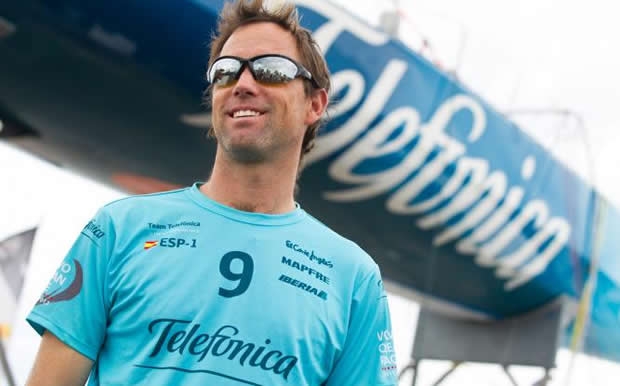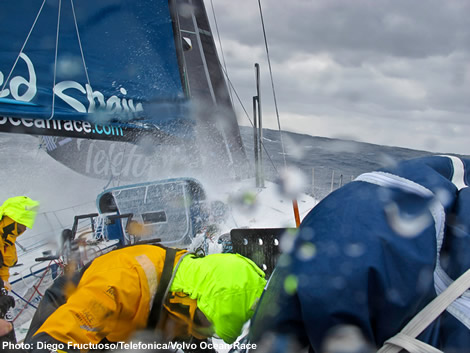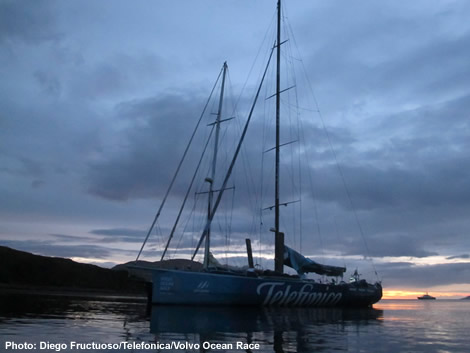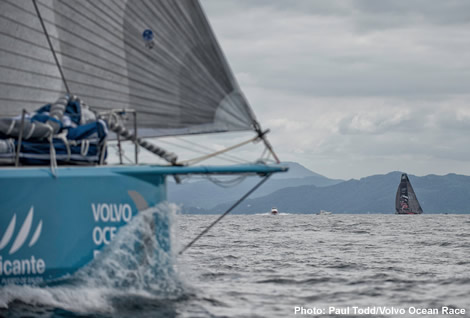Iker Martinez looks back at leg five
Everyone is talking about the very difficult conditions on this leg in the revered Southern Ocean, with only one boat making it all the way without stopping. Were they really that tough?
Iker Martinez: We knew that the conditions were going to be pretty fierce, with very strong winds, big swell and that the South Pacific was going to be tough and complicated, so it wasn't a surprise to us. We began with winds of 20 to 25 knots which then went up to 30, which is a fairly comfortable wind speed for these boats if it's stable, but what really made things tricky were the waves, which were really big. The wind continued to gain more and more speed and between each of the huge waves there were also other types of wave and the impacts were increasing in strength. When the waves began to crash there was a lot of foam and things became even more difficult because they came down hard on the boat and the crew.
What is the main concern on board when you are sailing in these conditions?
IM: The biggest issue and the thing that worries you the most is that due to the water on the deck, or when you're carrying out a manoeuvre that someone might fall overboard. Losing a member of the crew is our greatest fear and it's what we're most careful about.
What do you do to avoid something like that?
IM: Everyone must be tied to the boat at all times, with their harnesses on, which is something that the guys in the boat have done very, very well and that makes you feel a lot better. We were all tied to the boat and we're all here, which is what matters in the end, much more than getting here in first, second or third place.
Do you manage to actually get any sleep on board in conditions of 40 knots with waves reaching up to 6 metres?
IM: When the boat goes very fast, as happened in the Southern Ocean, the waves are really big and that causes big accelerations and sudden breaks. With the sudden breaks the boat moves around a lot, as do the guys in the bunks, so it makes resting very difficult. Also, you're always in a state of alert – you sleep, but you're unsettled, thinking that at any moment something could go wrong and you're in a state of tension. That means that you don't rest as much and means that tiredness can take its toll after a while.
All sailors speak of the Southern Ocean as something special, an ocean that most of us don't have access to. What does it feel like to sail there and what is it really like?
IM: It's a tricky place. You're always looking forward to going there, because if not you wouldn't do the round the world race, but at the same time you have this huge respect for it, because you also know that if you don't, you're in trouble. It's beautiful, it's tough and once you've sailed down there you have a personal sense of satisfaction at having been able to make it through those times. Although at the time, when things are really tough you ask yourself what you're doing there (laughs). You really want to go there, but once you're there you can't get out quick enough.
You suffered some delamination to the hull which forced you to stop. How does one take a decision like that in the middle of racing?
IM: We had to carefully evaluate the situation. We had a boat which was somewhat damaged, nothing serious, but obviously the risk of it getting worse was greater if we'd carried on at high speeds. We saw that Abu Dhabi was approaching from behind, but from far away and that Camper had run into trouble and would have to stop and that it was ourselves, Groupama and Puma who were doing well. It was one of those moments where we had to remember that this was a leg that we might not win the round the world regatta with, but where we could certainly lose it. We took stock and also came to the decision that a podium finish would be a good one for the leg: “We can't take the risk of this getting worse and really breaking”. That was what we had to do, we all knew it and that was what we did.
The pit stop at Cape Horn for many was seen as something unprecedented, especially in terms of the logistical efforts involved. What was it really like?
IM: You never enjoy having to stop when the others are still racing, but it played out well. We were able to get there, round Cape Horn, bring down the sails and seek shelter in a cove behind an island whilst the shore crew had come to meet us on a steel yacht with an interesting captain who usually takes people down to Antarctica... We'll remember those hours forever. Yet again the guys showed how important it is for the shore crew to be really good and that they are always on the ball. They really play a big part in getting the points in this race and we are really happy and very grateful for the efforts they went to.
How does one deal with the responsibility of leading a crew in such dangerous conditions?
IM: I think because of the nature of our crew perhaps it's easier on our boat than on others, because the crew has a lot of experience, we've always worked very well together and it's easy for us to get on with each other. I think that knowledge, which is what there's a lot of on here, definitely makes things easier. Of course, it's been difficult, but in that sense the team has helped a lot and everyone helped to make things that bit simpler and easier to deal with.
The comeback you guys made back to Itjaí was spectacular... what was it like for you all on board?
IM: We knew more or less that we were going to get better weather than them once we were further behind and we thought that we'd be able to make some good mileage, but all framed by the uncertainty of how long we would have to stop for. Once we stopped we saw that the if forecasts came good we might be able to really make up some miles, but we never imagined that we'd make up 400 miles.
What memory will stick with you from this leg?
IM: I'll remember it fondly, especially how we fought hard. When things go well you're always left with a great feeling and if things go badly you normally have a bad memory of things, but I think that even if the leg hadn't gone as well for us as it did, I'd still remember it positively... I think that in the end everyone fought hard and we did so as a team, including the shore guys. I'm really happy because we were all hopeful, we are all we very clear in our minds about what our aim is and what we want to achieve and that to get there it takes a lot of effort.














Latest Comments
Ed white 14/04/2012 - 18:29
How does this stack up with Juan K's comment about a tactical pit stop?Add a comment - Members log in